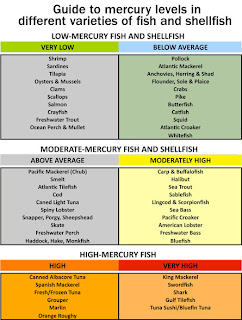Sustainable seafood and social issues related to food and culture. Written by the founder of the only exclusively sustainable seafood company in the US with a focus on culture and the the effects our food (especially seafood) choices have on the world and society. Also examines effects of wild fisheries, aquaculture and agriculture.
Tuesday, April 27, 2010
Mercury Update- thanks to the kids menu!
I was reading the children's menu at the new restaurant AKA Bistro Lincoln (MA) after seeing some tweets on how unique it was. The children's menu at the restaurant includes: Hawaiian Poke (tuna cubes) and Cod (type and source unknown). I was surprised as both can be high in mercury and other environmental contaminants. Restaurant tuna has been found to average over 0.75 ppm- the EPA action level for mercury is 0.5 ppm. At 0.75 ppm a child would be digesting over three weeks of the EPA maximum mercury action level dosage of mercury. This does not seem like a good choice for a kids menu. Cod can have elevated levels of mercury as well, but generally less than tuna- although it often carries dioxins.
Friday, April 16, 2010
"So, what makes you different?"
I was recently at a conference and was asked this question in the context of how we compare to another "sustainable" seafood company, specifically CleanFish. I was a little baffled by the question, but I quickly realized that to many folks we appear to be similar companies when in fact we are very different. So I thought it may be useful it to highlight those differences.
First, we believe that no animal protein, including fish, are truly sustainable when compared to plant proteins. Growing beans (an excellent protein source) is much better for the planet and probably your health than raising cows, pigs, chickens and fish. As for wild fish it is pretty obviously that is a very unsustainable proposition. It is in the context of this belief that we believe and support "culturally sustainable" seafood. The fact is you should not be eating seafood every day, but seafood is appropriate to eat to maintain a connection to cultural cuisines and to support local communities. Other "sustainable" seafood companies are out to sell you as much fish as as possible wrapped in a feel good story- even though the story is a fiction in light of the realities of fish harvesting and farming.
So, first difference: we want you to eat less fish, but when you do eat it make sure it is the best it can be for the oceans and local communities; and of course, that you buy it from us or someone like us.
Second, we believe in traceability and accountability to the producer level. We are not about branding a product and story; we are about promoting folks that are doing the right thing. We want you to know who produces your food so that you can reach out and ask them (and us) questions so that you can make an educated decision on what you will eat and feed to your friends and family. Transparency builds trust and underlies your relationship with the food you eat. Other "sustainable" seafood companies are out to sell you fish that is branded to take advantage of the "green" movement and the desire of many folks to eat the "right" fish. The fact these "brands" are just green cover for agribusiness as usual should not be a surprise.
So, second difference: we want you to know where your food is from, who produced it and know that you can contact these producers to learn more about them and their fish.
Third, we believe in working with growers and harvesters to develop their businesses and to implement best practices. We actually go into the field to assist fishermen and farmers to bring the most sustainable fish possible to market- all while encouraging a living wage for families. Other "sustainable" seafood companies are often just fronts for industry seafood companies that are all about corporate profits not supporting communities and our planet. We know you can make a living doing the right thing, because we are; and we can continue to do so with your support.
So, third difference: we are part of social and economic change that helps communities and families make a living while doing the right thing for our food chain and the planet.
We are different from the other "sustainable" seafood companies in many ways not enumerated here. Our culture as a company is one that is based around holistic living and a well balanced lifestyle. We support our vendors, customers, investors and employees in achieving a balance in living a fulfilled and healthy life by creating a network of food that is not just an ingredient, but rather a cultural binding agent that joins us all together.
I guess the real difference from us and all the others that claim to do what we do is that we are true to ourselves, our values, and our community. I think that sums it up.
Subscribe to:
Posts (Atom)
